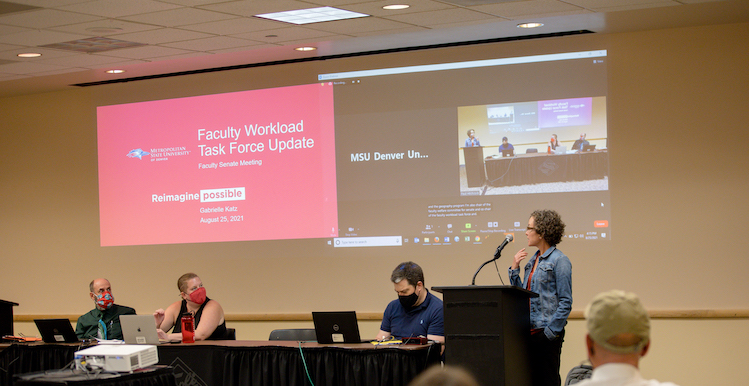
Photo by Sara Hertwig MSU Denver Faculty Senate

The Metropolitan State University of Denver Faculty Senate held a special session Wednesday to give a second read and vote on the faculty workplace proposal, which passed with 78 voting yes, six voting no and one abstention.
To begin the meeting, the Faculty Senate passed quorum and Kelly Evans gave an overview of Robert’s Rules. The body then voted to limit speaking time to five minutes instead of the usual 10 minutes and allowed Provost Alfred Tatum, Ph.D., to speak during the special session.
Sen. Gabrielle Katz opened with a second read of the workplace proposal, intended to give Category I and Category II faculty members an easier workload through a reduction of mandatory classes.
Sens. Krista Griffin, Biff Baker, Jessica Ritter, Mandi Schaeffer Fry, Azure Avery, Christina Foust, Jessica Weiss, Christopher Meloche and Katz all spoke in favor of the proposal due to their already-overwhelming workload, but there was also an opposing voice.
“Contrary to the claims outlined in the white paper that this proposal will improve our ability to engage in high-quality teaching, having classes that large will negatively impact our students, our ability to engage meaningfully with them and to provide them with individualized attention,” Sen. Courtney Rocheleau said.
Rocheleau said the policy will “disproportionately and inequitably harm” departments such as Psychological Sciences, which already has the largest class size at MSU Denver at an average of 33 students per class, according to the spring census. To implement the proposal, MSU Denver will have a reduction of 25 classes by next spring. Without additional funding, it’s likely that class sizes could further increase, including doubling online classes.
Sen. Jeff Parker followed Rocheleau’s opposition by saying, “For some of us, we’re already drowning. And speaking on behalf of my department, and on behalf of everyone else who feels like they’re drowning, we need this. No other way to put it.”
After discussion, Evans motioned that the proposal be sent to a vote, which overwhelmingly passed.

